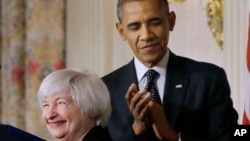Janet Yellen is likely to face sharp questioning at her confirmation hearing this week to become chairwoman of the U.S. central bank, but most analysts think eventually she will win approval as one of the most powerful unelected leaders in the world.
There does not appear to be any organized opposition to U.S. President Barack Obama's nomination of the 67-year-old Yellen to become the first woman to head the Federal Reserve when the current chairman, Ben Bernanke, leaves office at the end of January.
But Republicans on the Senate Banking Committee are expected to closely question Yellen, now the Fed's vice chairman, about policies the central bank has adopted to try to boost the American economy, the world's largest. The country is still faced with high unemployment as it slowly recovers from the 2009 recession, the steepest downturn for the U.S. since the Great Depression of the 1930s.
The chief economist at the Standard & Poor's credit-rating company, Beth Ann Bovino, said she thinks Yellen will be confirmed. Bovino said lawmakers, however, will want answers from Yellen at Thursday's hearing about her support for the Fed's $85-billion monthly purchase of securities to pump more money into the economy. Specifically, Bovino said they will want to know when the Fed might begin to trim the purchases, to "taper" them, in the jargon of economists.
But Bovino said Yellen might not be as forthcoming as some lawmakers would like. "I think she's going to stay away from questions of tapering. On that note, I think she's going to again stick to the party line and hold to the decision on tapering is really a matter of [economic] data. It's data driven."
At least one Republican senator, Lindsey Graham of South Carolina, said he will try to block Yellen's confirmation until Obama agrees to let more State Department officials testify about the details of the 2012 terrorist attack on a U.S. compound in Benghazi, Libya that killed four American diplomats, including an ambassador.
Economic analyst Mark Hamrick of bankrate.com said any delay in Yellen's confirmation would create uncertainty in world financial markets and slow the U.S. economy.
"We're at a point with the U.S. economy where we need to be subtracting uncertainty, not adding to it. And if, indeed, some of these senators were to try to hold up the Yellen nomination, they're again causing, in a sense, damage to the economy," said Hamrick.
Policy makers at the Federal Reserve, led by its chairman, make decisions that shape the U.S. economy. They also often influence key leaders overseas, though, as they decide how to advance the massive economies in Europe and Asia and the more regional economic fortunes in South America, Africa and elsewhere.
Bovino said that as a result, the Fed chairman is an important figure in world economic circles.
"There certainly now is a question of unwinding their large bond purchases and that's going to have large ramifications across the world. So whomever's in charge is going to be the leader and those decisions... will certainly be someone that people are going to be watching," said Bovina.
There does not appear to be any organized opposition to U.S. President Barack Obama's nomination of the 67-year-old Yellen to become the first woman to head the Federal Reserve when the current chairman, Ben Bernanke, leaves office at the end of January.
But Republicans on the Senate Banking Committee are expected to closely question Yellen, now the Fed's vice chairman, about policies the central bank has adopted to try to boost the American economy, the world's largest. The country is still faced with high unemployment as it slowly recovers from the 2009 recession, the steepest downturn for the U.S. since the Great Depression of the 1930s.
The chief economist at the Standard & Poor's credit-rating company, Beth Ann Bovino, said she thinks Yellen will be confirmed. Bovino said lawmakers, however, will want answers from Yellen at Thursday's hearing about her support for the Fed's $85-billion monthly purchase of securities to pump more money into the economy. Specifically, Bovino said they will want to know when the Fed might begin to trim the purchases, to "taper" them, in the jargon of economists.
But Bovino said Yellen might not be as forthcoming as some lawmakers would like. "I think she's going to stay away from questions of tapering. On that note, I think she's going to again stick to the party line and hold to the decision on tapering is really a matter of [economic] data. It's data driven."
At least one Republican senator, Lindsey Graham of South Carolina, said he will try to block Yellen's confirmation until Obama agrees to let more State Department officials testify about the details of the 2012 terrorist attack on a U.S. compound in Benghazi, Libya that killed four American diplomats, including an ambassador.
Economic analyst Mark Hamrick of bankrate.com said any delay in Yellen's confirmation would create uncertainty in world financial markets and slow the U.S. economy.
"We're at a point with the U.S. economy where we need to be subtracting uncertainty, not adding to it. And if, indeed, some of these senators were to try to hold up the Yellen nomination, they're again causing, in a sense, damage to the economy," said Hamrick.
Policy makers at the Federal Reserve, led by its chairman, make decisions that shape the U.S. economy. They also often influence key leaders overseas, though, as they decide how to advance the massive economies in Europe and Asia and the more regional economic fortunes in South America, Africa and elsewhere.
Bovino said that as a result, the Fed chairman is an important figure in world economic circles.
"There certainly now is a question of unwinding their large bond purchases and that's going to have large ramifications across the world. So whomever's in charge is going to be the leader and those decisions... will certainly be someone that people are going to be watching," said Bovina.






